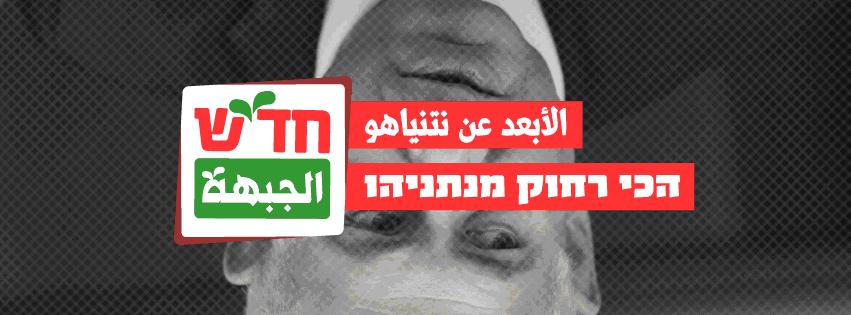A poll conducted by the Panels Research Institute and published in the Friday, December 5th editions of the right-wing newspapers Ma’ariv Sof Shavua and The Jerusalem Post reveals that Prime Minister Benjamin Netanyahu’s chances of easily winning the March 17 election are much lower than was previously expected. Among the 500 respondents who were asked on Wednesday of this week whether they would want Netanyahu to remain prime minister after the elections, 60% said no, only 34% answered yes, while 6% claimed that they did not know.
 Caption: “As far from Netanyahu as possible.” (Source: Hadash)
Caption: “As far from Netanyahu as possible.” (Source: Hadash)
The two newspapers which commissioned the poll indicated that, in contrast to a Geo-cartography Institute poll broadcast on IDF Radio this week which predicted that Netanyahu’s Likud would take 30 Knesset seats in the upcoming elections, the 21 seats forecast for this party by the Panels poll were far closer and even one less than two other polls conducted this week by Channel 2 and 10, each of which gave the Likud only 22 seats. Furthermore, the Panels poll found that, if the the elections were held today, HaBayit HaYehudi would trail the Likud by only 3 seats, with18;.Labor would win 14 seats; Kahlon’s party and Yesh Atid would get 11 seats each. Single figure results would be 9 seats for Yisrael Beytenu, 8 for United Torah Judaism and Meretz, 7 for Shas, 5 for Hadash, and 4 for both Hatnua and the United Arab List. The Panels poll predicts that neither the Arab party Balad party nor the centrist Kadima list would pass the electoral threshold, which legislation passed during the nineteenth Knesset has raised from 2% to 3.25%.
When asked about the main liabilities of the outgoing government, 64% of the respondents to the Panels poll cited a worsened socioeconomic situation while 58% believe that the security situation has deteriorated since the last general elections. Responding to the question of which issue will be dominant for them when deciding for whom to vote on election day, 34% answered the economy, 30% security, 14% social justice, 10% matters of religion and state, 5% Arab-Jewish relations, and 2% education and culture. Only 1% of those polled said that Israel’s foreign relations will be the decisive factor for them when casting their ballot.


